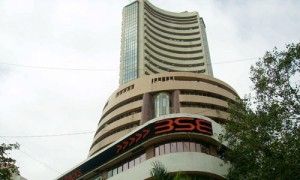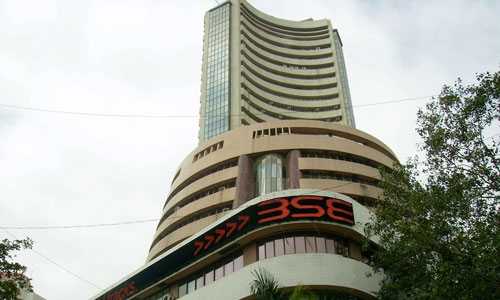By: Ravi Sinha
Track2Realty Exclusive
 The stock market is not only showing the investors’ confidence index going up. It is also indicating the way forward for the Indian real estate. After all, investor sentiment on the bourses have often led to the recovery of the real estate market as the investment grows to the next level of confidence for a long term investment. It may be too early for concluding whether the stock recovery is here to stay and lead to revival of the fortunes of the real estate, yet Track2Realty finds the debate has gained ground. While the developers are optimistic about the money sooner than later coming into the sector, the critics have their own reasons to advice wait & watch policy, if not outright denial.
The stock market is not only showing the investors’ confidence index going up. It is also indicating the way forward for the Indian real estate. After all, investor sentiment on the bourses have often led to the recovery of the real estate market as the investment grows to the next level of confidence for a long term investment. It may be too early for concluding whether the stock recovery is here to stay and lead to revival of the fortunes of the real estate, yet Track2Realty finds the debate has gained ground. While the developers are optimistic about the money sooner than later coming into the sector, the critics have their own reasons to advice wait & watch policy, if not outright denial.
An outside view on the investment pattern in the Indian market might give the impression that there is absolutely no co-relation between the investments into these two different investment instruments. Critics often even point out that the two investment baskets actually work at the cross purposes. They maintain that while the stock market is driven by the small ticket & high risk investors, the real estate is relatively low risk and safe investment. However, such outside view often just take into account the investment pattern of the retail investors and not seasoned big-ticket investors and the Foreign Institutional Investors (FIIs). There is a strong co-relation between the investment pattern of these two diverse options and often it is the Sensex that shows the way forward to the real estate.
Historically, it is the bourses that have been the first to attract the investors in the cyclic upward movement of investment. It then leads to a shift in real estate over a period of six months to one year. The trend has been as much noticed in the global market as in the Indian market. Facts speak for themselves to describe the co-relation between the two. The real estate sector has been facing a slowdown since the end of 2009 and on the same pattern the BSE Realty index has fallen over 57 per cent from November 2009 to April 2014.
Now with the recovery of the market this financial year, till August 4, the Bombay Stock Exchange (BSE) Realty index had risen 30 per cent to 1,893. It was at 1,456 on April 1. The BSE Sensex rose 14 per cent during the period. The BSE Realty index is the only index that has not recovered from the lows touched during the 2008 crisis. The index, which touched 2,270 on June 9, 2014, after rising from below 1,250 in March, is now back around 1,900. It touched a high of 13,647.15 on 14 January 2008 and fell to 1,303 on 9 March 2009. The trend of recovery in real estate seems to be on the same lines and as per the Reserve bank of India (RBI) the amount of housing loans, including for priority sector housing, rose 3.20 per cent from Rs 5,45,100 crore in April 2014 to Rs 5,63,100 crore in June 2014.
However, Sumit Jain, National Director, Finance & Administration with Colliers International maintains that stock market growth should ideally lead to spill over on realty but it is too early to comment on this. He says that the equity market is currently driven by domestic and foreign institutional investors. Return from equity reviving real estate market will take a much longer time. Retail investors need to first recover the past losses before they take out returns and invest in real estate.
Abhay Kumar, CMD of Grih Pravesh Buildteck, on the other hand strongly feels there is a link and the stock market upsurge has a direct correlation with the realty. He asserts that historically it has been observed that usually there is a six months to one year gap in rally where realty market follows stock market. Currently stock market is making all time high almost every week and the market does not look very attractive at this point in short term but the long term market still looks bullish. In such events the spill over from stock market to the largest asset class which is realty is bound to see some fresh funds percolating.
“Realty market is going through tough times and stock market can bring back some cheer. In India we always see whenever there is bull market initially overseas funds are the main reason for it and later the retail and domestic funds start pouring in, this bull market is no different. Retail investors were extremely cautious to enter as the 2008 bear market is difficult to forget, retail investors are gradually but firmly coming back to market. Indians by nature like real estate market as they look it as low downward risk avenue. Whenever they realise some real profit from stock market they immediately switch their investment to realty. In this rally one can see some serious investors who are participating in stock market and once they book profits it would help in revival of real estate significantly,” says Abhay.
Rattan Hawelia, Chairman Hawelia Group also believes that the real estate market and stock market are interconnected in multiple ways. In existing scenario, with relatively stable economic conditions, there is a growth in the stock market and hence a positive impact on real estate sector is expected. He adds that since growth of real estate sector leads to the growth of other multiple dependent industries, an incremental effect on the stock market can also be anticipated.
“The reform process and focus on allowing FDI in realty sector has brought the necessary momentum and has rebuild the confidence in investors’ minds, specially on the international front. This would attract the hesitant investors to India which will certainly have a positive impact on the revival and development of real estate sector. Further, with the presence of a strong government and bold investor-friendly policies, we can anticipate appropriate incentive to serious investors and hence an eventual improvement in the real estate market,” says Hawelia.
Geetambar Anand, CMD of ATS Group believes the bull run is likely to continue for next 2-3 months but it would be interesting to see how the home buyers regain their confidence by the gains in the short-term capital markets which will ultimately melt down to the long-term investments with longer time horizons. “There are serious investors who are currently driving the equity markets, the inflow of funds are also likely to improve in the real estate markets as the investor confidence shoots up,” says Anand.
In a nutshell, the investment, both in stocks as well as real estate, usually moves in tandem with economic growth. The investment pattern of both the retail investors as well as the institutional investor is no different either. That is why economic slowdown over the past few years hit both the Sensex and the real estate market badly. But with the prospect of economic recovery and change in sentiments the investors are back in market, and hence the debate over the choice of investment portfolio – stocks, realty stock & real estate – is gaining ground yet again. It is a good sign for a market waiting for any upward movement for long. What can be vouchsafed at this point of time is that investors are back in market with stocks and that raises hopes for the money to come in the safest investment instrument. Historically, this has been the trend.
Advocates see co-relation
- Historically, investment in stocks & real estate has a co-relation
- Historically stock market surge has led to revival of realty
- On Sensex Realty Index the first to recover
- Both realty & stock sentiment driven
Critics find disconnect
- No co-relation of stocks & realty investment
- Impression of a co-relation only because bullish economy leads to investment everywhere
- Small ticket investment with stocks against big ticket investment with property
- Stocks investment for short term but realty investment for long term
Quick stats
- Since 2009 realty down & BSE Realty index fallen over 57% from November 2009 to April 2014
- Till August 4, 2014, the Bombay Stock Exchange (BSE) Realty index had risen 30 per cent to 1,893. The BSE Sensex rose 14 per cent during the period.
- The BSE Realty index is the only index that has not recovered from the lows touched during the 2008 crisis.
- Realty index touched 2,270 on June 9, 2014, after rising from below 1,250 in March, is now back around 1,900.
- Realty index touched a high of 13,647.15 on 14 January 2008 and fell to 1,303 on 9 March 2009.
- The trend of recovery in real estate seems to be on the same lines
- The Reserve bank of India (RBI) the amount of housing loans, including for priority sector housing, rose 3.20 per cent from Rs 5,45,100 crore in April 2014 to Rs 5,63,100 crore in June 2014





